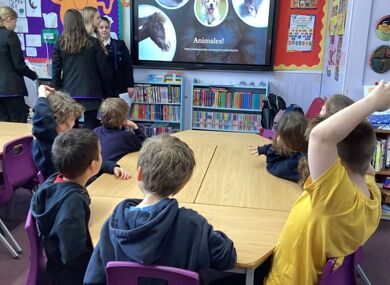- Home
- Children
- Subject Information
Primary Languages - Mrs Gatter
"If you talk to a man in a language he understands, that goes to his head. If you talk to him in his own language, it goes to his heart."
Nelson Mandela
Intent:

Primary-Languages-NEW-Curriculum-KS1-to-Year-6.pdf
Learning a foreign language is a necessary part of being a member of a multi-cultural society and provides an opening to other cultures. At OPJS it is our intent to foster children's curiosity and deepen their understanding of the world through high-quality languages education. Children express their ideas and thoughts in another language and understand and respond to its speakers, both in speech and in writing. We hope that by teaching the foundational knowledge of three languages (French, Spanish and German) at our school, it will provide a passion for learning further languages, equipping children to study and work in other countries.
At Oldfield Park Junior School, we further pupils’ understanding of languages through our cross-phase learning activities with local secondary schools as well as enrichment sessions like European Day of Languages, and regular Residential visits to France and the Netherlands.
Implementation:
The teaching of Primary Languages across the school follows the National Curriculum through using a scheme of work to support non-specialist teachers (Kapow) for French and Spanish, and the German curriculum follows the same pattern as French and Spanish, but the resources are created by the subject lead. Pupils have a Primary Language lesson weekly.
Through regular teaching, children are taught to:
- listen attentively to spoken language and show understanding by joining in and responding
- explore the patterns and sounds of language through songs and rhymes and start to link the spelling, sound and meaning of words
- engage in supported conversations; ask and answer questions; express opinions and respond to those of others; seek clarification and help
- speak in sentences, using familiar vocabulary, phrases and basic language structures
- present ideas and information orally
- start to read carefully and show understanding of words, phrases and simple writing
- appreciate stories, songs, poems and rhymes in the language
- broaden their vocabulary and develop their ability to understand new words by using cognates and near-cognates from different languages
- describe people, places, things and actions orally and in writing
- understand basic grammar appropriate to the language being studied, including (where relevant): feminine and masculine forms or sentence structure and how these differ from or are similar to English
- Have an insight into the life and culture of France, Spain and Germany.
- Through regular teaching, children are taught to:
- listen attentively to spoken language and show understanding by joining in and responding
- explore the patterns and sounds of language through songs and rhymes and start to link the spelling, sound and meaning of words
- engage in supported conversations; ask and answer questions; express opinions and respond to those of others; seek clarification and help
- speak in sentences, using familiar vocabulary, phrases and basic language structures
- present ideas and information orally
- start to read carefully and show understanding of words, phrases and simple writing
- appreciate stories, songs, poems and rhymes in the language
- broaden their vocabulary and develop their ability to understand new words that are introduced into familiar written material, including through using a dictionary
- start to write phrases from memory, and adapt these to create new sentences, to express ideas clearly
- describe people, places, things and actions orally and in writing
- understand basic grammar appropriate to the language being studied, including (where relevant): feminine and masculine forms and the conjugation of high-frequency verbs; key features and patterns of the language; how to apply these, for instance, to build sentences; and how these differ from or are similar to English
- Have an insight into the life, culture and capital of France.
Impact:
Assessment of children's learning in Primary Languages is an ongoing monitoring of children's understanding, knowledge and skills by the class teacher, throughout lessons. This assessment is then used to inform differentiation, support and challenge required by the children.
Summative assessment is conducted by class teachers across each year group of the school to inform the subject leader of progress or skills and knowledge still to be embedded. This is to be recorded in the Assessment Document Folder.
Primary Languages is also monitored by the subject leader throughout the year in the form of book monitoring, drop-ins and informal pupil interviews to discuss their learning and understanding and establish the impact of the teaching taking place. Monitoring for the subject also happens in Primary Languages assemblies.
Primary-Languages-Policy-2024-25.pdf





